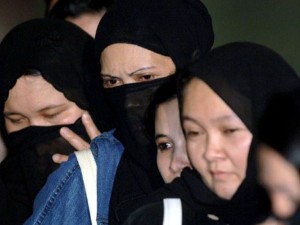
Overstaying Filipino workers released in Saudi Arabia queue for the training scholarship certificates given by the government upon their arrival in Manila. AFP File Photo
More than a quarter of a million Filipino domestic helpers currently in Saudi Arabia may be affected by a domestic deployment halt imposed by Saudi Arabia starting today (Saturday), according to recruiters.
Emmanuel Geslani, a consultant for several Manila-based recruitment agencies, said between 250,000 and 300,000 Filipino domestics currently in Saudi Arabia may no longer be rehired after negotiations between Riyadh and the Aquino government on a proposed $400 minimum wage for domestics reported ended in deadlock.
Riyadh also objects to a requirement of the country’s new Migrant Workers and Overseas Filipinos Act of a certification from the Philippine embassy that domestic workers’ rights are protected.
The Department of Foreign Affairs reportedly submitted a report to labor officials stating that Saudi Arabia had a poor record of protecting domestic labor rights.
Geslani said between 30,000 and 50,000 Filipino domestics come home every year after finishing their contracts to take a vacation and await the renewal of their contracts. These contracts, he said may no longer be renewed.
Geslani also dismissed Presidential Spokesman Edwin Lacierda’s statement that there were other countries who may accept Filipino domestics displaced from Saudi Arabia.
“It’s another figment of the imagination of the Aquino administration, which failed to anticipate the serious repercussions of the hard-ball stance of the labor department and the Philippine Overseas Employment Agency during negotiations for deployment terms,” he said.
The issues between Manila and Riyadh have been unresolved for the past three months, during which the deployment of about 3,000 domestics per month was suspended by the Saudis, he said.
In separate interview with reporters, Labor Secretary Rosalinda Baldoz and OWWA Administrator Carmelita Dimzon said the government would be intensifying its “Balik-Pinay! Balik Hanapbuhay!” project to “transform the domestics into entrepreneurs.”
According to Baldoz, the government will present displaced Overseas Filipino Workers (OFWs) with a “ready-to-go roll-out self-employment package of services, consisting of short-gestation training, start-up kits, business counseling, and technical and marketing assistance” for such services as massage, cosmetology and production of soap and slippers, among others. They could borrow a maximum of P10,000, the National Reintegration Program for OFWs, she said.
Some Filipino maids report good to tolerable working conditions in the Middle East. But there are also many stories of domestic slavery coming out of Saudi Arabia and other countries in the region. Many domestics are reportedly made to work seven days a week with little food or rest. Some are locked up in rooms and not allowed to go out. They are forced to work for years until their contracts expire. Some have complained of physical and sexual abuse.
Philippine government personnel have been criticized by migrant organizations for failing to do enough to protect overseas Filipinos from domestic slavery.

